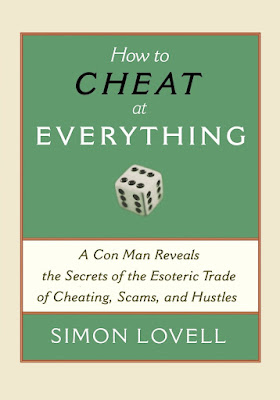I've just finished How to Cheat at Everything by Simon Lovell. It's a good read, although the lengthy descriptions of false cuts, dodgy deals, and ways to conceal or peek at what you shouldn't during high-stakes card games got repetitive.
In fact, at some level the whole book is extremely repetitive: there is always somebody looking for an angle and if you're the producer, consumer, or user of anything you are a potential target.
Sometimes the angle is knowledge. Being aware of, or being able to calculate, probabilities will protect against some scams, such as those at the fairground or in amusement arcades. In them the punter is lured in through social engineering to play a game they will never win. That's not to say they won't get some return, of course, just that its value will be minuscule relative to the cost.
Sometimes the angle is ambiguity. Bar bets are essentially riddles for money and the setup will make them sound like a sure win for the punter. In the Lit Cig Prop the hustler will claim to be able to light a cigarette, take four full drags, knock off the ash, and leave it the same length as when it started. Impossible? Not if the fag is lit in the middle!
Sometimes the angle is just plain deception: hiding a card up a sleeve, "gaffing" the equipment on the stalls at fun fairs, apparently selling a punter a DVD player but putting a brick in the box they carry away, or promoting Ponzi schemes.
Whatever the angle, the aim of the con artist is to put the punter in the position of thinking they know best in a scenario where they really don't. Once the hustle is done, the hustler moves on to the next score, and the victim is left to rue their lot, the emotional distress often as significant as the financial loss.
When we think about cheating, as ethical software testers, we are probably considering risks to our business. How could a bad actor find an angle to exploit in our product or service? Do they know of a vulnerability in a library we use that lets them into our back end? Do they have some plausible way to misinterpret our terms and conditions to make a claim against us? Could they misrepresent themselves to get access to privileges they shouldn't have?
A less obvious approach is to take the mark's perspective. The feelings that follow from being let down are strong and long-lasting. No business would want their customer to have those kinds of feelings about them. So can we think of scenarios in which our customers might feel cheated by us? If yes, how would we handle that?
Image: Amazon
